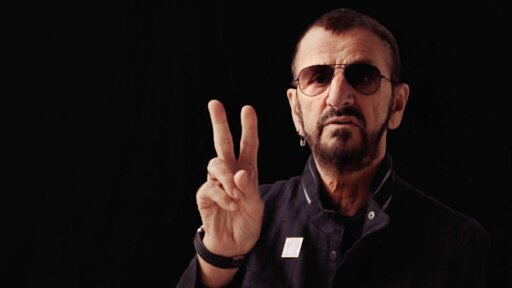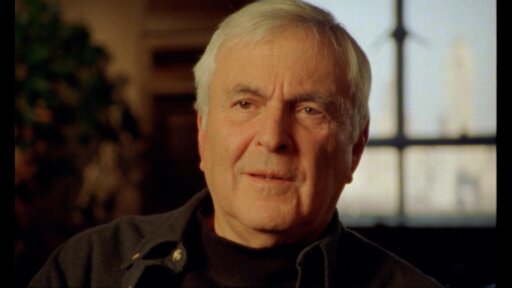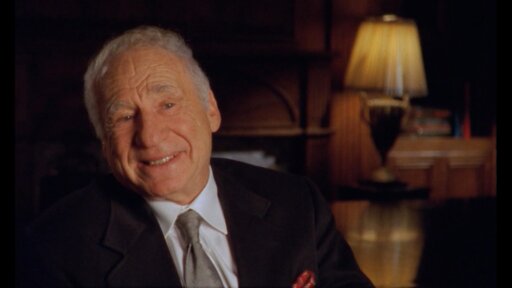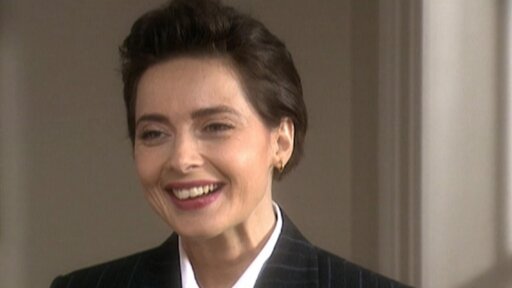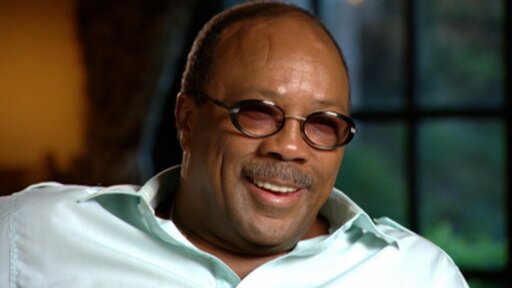TRANSCRIPT
- [Interviewer] Here's a broad question.
Why do you think Broadway musicals have always had such special meaning for gay men?
(Harvey laughing) - Why do... (Harvey sighing) You gotta start with music.
Music is the universal language.
And music from music, you can't... Ellen Stewart, when I was a kid back at La Mama, and I used to write my plays, and Ellen would say, "Baby, you got to write a musical."
And I said, "Why?"
She goes, "'Cause I can't take these damn plays to Europe.
You know, I can't take 'em to the festivals."
She said, "You got all that conversant and nobody want to hear that damn conversant.
Now, you give some music and everybody can understand that."
So if you take Ellen's explanation of that, then you understand why music reaches everyone.
You have to start with music being the basic form of the Broadway musical .
Without the music, it's drama.
And that's a whole other thing.
But music.
And music speaks to you universally, speaks to everyone.
What music does is conveys emotion in the way that speech doesn't necessarily, unless you understand the language, the words and the everything else, and the context.
But music reaches beyond that.
When you are writing a Broadway musical, you know, or writing in that form, you say, "When does it sing?"
You know, you talk up to the point where the emotion becomes so large that mere words don't encompass it anymore.
And then it elevates the emotion, it elevates it to music.
That is why opera.
You know, many people make fun of dramatic opera because it's so dramatic, but it's so dramatic because it's music.
If you just did it without, it would seem melodramatic in acting, but the music allows that extra emotion and takes you to that next type, which also allows people that don't even know what you're singing about to experience it.
So since you have that context, which is the life to the uber, then you have gay men who seem to go life to the uber easily, more and more easily.
I mean, I know a lot of gay people that hate opera, but I also know a lot of gay people that like opera.
And I think that there's something to it when you...
I think for a lot of gay men in the theater, creating in the theater, writing in the theater, who were not allowed to express themselves in their own lives, to write about their own experience and all that, they gravitated to the musical theater because they could take that fabulous emotion they were feeling, and at least put it in a context that was gay, meaning uber.
And even if they had a write about, you know, singing to Antoinette instead of to Tony, instead of to Anton.
So that may be why, I don't know.
But you know the joke.
You know, you take six Jewish gay men and put 'em in a room, what do you get?
Broadway musical.
And it seems to work.
I mean, look at "Hairspray."
Not a heterosexual in sight.
I mean, well, there are some heterosexuals mixed in.
You know, it's kind of country we live in, but you gotta let them in.
They're our kids, you know, heterosexuals.
You have to allow them here and there.
They bus them in, bus them into theater.
The tradition coming from Europe of drag, which had the gay thing under it, was quite normal.
I mean, there were troupes in the teens and twenties that...
There was an Irish troupe that half of them did drag and half portrayed male roles.
And there were acts like Savoy and Brennan, which is the drag act that taught Mae West how to be herself.
You know, "Come up and see me sometime."
That was Savoy and Brennan.
The song "Margie."
You know that song?
♪ Margie, I'm always thinking ♪ That was their theme song.
They were the precursor to Burns and Allen.
They were a standup act that played for Ziegfeld.
And so the gay sensibility was always there.
In fact, in the '20s, it was less covered up than in the '50s or the '60s.
They would do not only the Follies on Broadway, they would do the Greenwich Village Follies, which was a drag version of the Follies.
They do the same numbers, only downtown.
So Mae West used gay characters in her plays right from the beginning.
I mean, that's why her plays were scandalous to some.
She used drag characters, she had a play called "The Drag."
She wrote about gays and she wrote quite honestly about their lives, and people always...
Whether they did the plays or not is another matter.
I mean, Eli Wallach once attacked me on an airplane in like, in 1981, and said, "You know, you ain't the first one to play a gay on Broadway.
You know, I was... " And I said, "I know, "Staircase" in 1960."
Whatever that was, and you know... And for its time, it was a very honest portrayal of a gay relationship, a funny gay couple living in the world that they knew.
So we've always been there.
Whether we got seen by large groups of people or not is the difference.
"Torch Song Trilogy."
Hardly the first gay play on Broadway, but first gay play ever to make money on Broadway.
And this is America.
And unless you can make money, it don't count.
So, "La Cage aux Folles."
Hardly the first gay musical on Broadway, but the first gay musical to make money.
And that's what makes it count.
That's what all of a sudden America turns around and goes, it makes money.
Right now as we're sitting here, there's a TV show that's just come on called "Queer Eye for a Straight Guy" on Bravo of all things.
I mean, a cable station, that's usually number 75, right, in the ratings.
It's in the top 10.
All of a sudden, trust me, in every executive office of every cable and network station in the world, there are gay shows now gonna be done because that's what it's about.
You know, in America, it's about what sells and what makes money.
So, where did we start this question?
(laughing) - [Interviewer] No, that was great.
- "La Cage aux Folles" opened on Broadway and was this huge hit and ran for five years.
We sent out a tour and a bus and truck we sent out.
We had two tours running that did incredibly well all around the country.
When you do that and that many people see what you're doing and embrace it and scream and tear the seats out and love it, you're changing the world.
You are.
Whatever the subject is, you're changing the world.
This happened to have the subject it did.
Does it reach the number of people the television does?
No way.
I mean, it could run on Broadway for five years, sold out every performance.
Still, more people are gonna see the lowest rated TV show one night than will ever have seen that on Broadway.
But when you reach people on the level that "La Cage" reached them, the level that live theater can reach you, which a movie can't, a TV show can't, live theater reaches you in a way that only two people in the same room reach each other.
It changes lives, I think.
So, you know, something like "Birdcage," which was a, you know, third hand adaptation of "La Cage," which made millions and millions of dollars, was obviously seen by millions and millions of people.
Which one changed more lives in the long run?
I'd go with the Broadway musical.
I would say anybody who saw "La Cage" live on stage left the theater as a different person.
Anybody who saw "Birdcage," wonderful film as it is, was entertained but may not have changed their lives.
I was handed a classic five-act French farce that had been done in Paris that I was shocked when I read it.
It was so anti-gay.
It was...
The way that the husband got the drag queen, his drag queen wife, on stage was by beating him up, you know, and then he had a big black eye and went, "Oh, Georges, you really do love me."
I mean, it was like... And I said, "No, I'm not doing this."
And Alan Carr said, "No, you will do what you do with it."
You know, and I took this farce that was very much...
It did have the elements of love in it, don't get me wrong, but it was very stereotypical, very demeaning of gays.
It was almost a minstrel show, a gay minstrel show in those terms, and I made it all about love.
This was a couple that had been together for 20 something years.
This was the best couple in the show.
This was the real loving married couple.
Jerry Herman took that and made it sing.
Once again, you know, when it came time to sing.
When this boy needed to know who that drag queen was, you know, and he wrote a song, "Look Over There," of all the loves in your life, no matter how long you live, no matter who you love, no matter who loves you, no one will ever love you more than that man sitting over there, that person who raised you.
They were not prepared for that.
And Arthur Laurents likes to tell the story of how the three of us were sitting sort of in the back of the house at an early preview and there was a couple in front of us.
And when the gay couple began to sing, "Song on the Sand," they put their arms around each other.
This was in Boston, a Boston tryout, an early Boston tryout, A middle-aged Boston proper couple put their arms around each other and found their love for each other in this love that the two men were expressing on stage.
That was the shock, that people were in drag, they were ready for.
That they could understand their lives and have their lives illuminated by gay characters.
That was the shock.
But that was also the shock of "Torch Song."
You know, here's somebody who they thought their lives were unlike, and only to find out, we basically are all the same.
It's magic, it really is magic.
And I grew up with that and wanting that.
And so when I went into theater and community theater and I was who I was, which was this kind of strange artistic boy who always studied painting and all that, and all of a sudden I was in theater and all of a sudden I was working for Andy Warhol and he was putting me in a dress, and then I was experimental theater and all that and wrote in my first plays, which were all musicals.
I wrote "Flatbush Tosca" and "Freaky Pussy" and "In Search of the Cobra Jewels," and "Cannibals Just Don't Know No Better."
And these were all musicals.
But you know, the idea being, these were my little downtown versions of a Broadway musical.
But the dream even, you know, in the back of my mind, like any kid that wants to be a Rocketeer or the President was, I wanted to be Ethel Merman.
You know, Ethel Merman had changed my life.
Ethel Merman had given me goosebumps up and down my arms and made me sit in a theater where I thought I would die if this show ever ended.
And I wanted to be that.
And those are the dreams you let go of, you know, because they're never gonna happen.
You know, they're just not gonna happen, you know.
And all these years later, this opportunity came as opportunities do in life.
And I always say to everybody, your life is as exciting as the number of times you're willing to say yes.
'cause most of the time we say no, you know.
And all day long people are asking us to step out of our boxes and all... And I don't care who, what life you live, you know, shoe salesman or not, people ask you all day long to step outta the comfort box.
And it's just easier to say no or turn away from that idea or whatever.
But I've been lucky enough to have been given parents that said, "Yes, yes."
No matter how bizarre it is, yes, Harvey, go, do."
And this opportunity presented itself and I stepped outta that thing.
And I'm sitting in Ethel Merman's dressing room and I wear a big red wig and I wear a dress.
And unlikely as that's gonna sing.
And eight times a week I sing, ♪ For me ♪ And I get to sing Ethel's immortal line.
That's as good as it gets, Cookie.
- [Interviewer] I think- - We're done.
(indistinct) Good.
We're too late anyway.
- [Interviewer] Thank you.
- [Harvey] All right, get the hell outta my dressing room.
(bright music)

